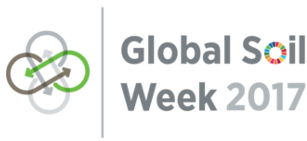![]()
Tuesday, 21 April 2015
Day 3: Means of implementation, and Monitoring & Accountability
Organisations
GIZ – Deutsche Gesellschaft für Internationale Zusammenarbeit (Germany)
Presentations by
Elias & Deichert (1 MB)
Gustravo Jimenez (1 MB)
Hassan Chourabi [French] (6 MB)
Hassan Chourabi (7 MB)
Mamadou Abdou (2 MB)
Mario Coto (3 MB)
Mary Ellen (1 MB)
Regina Birner (3 MB)
Tekalign Mamo (13 MB)
Thorunn Petursdottir (11 MB)
Please download the Rapporteurs’ Report here.
Rising food prices, political unrest, and the global climate regime – land and soil rehabilitation is gaining momentum as a solution to many of these challenges. With a rising population, it is estimated that that at least an additional 120 million hectares (about the size of South Africa) will be needed by 2030 to respond to the growing food demand. Many countries will soon have reached their limit for agrarian expansion; and in other parts of the world, long-protected forests and other natural landscapes will have to be converted to make way for agricultural production – unless we can make land and soil rehabilitation work on a large scale, in many different contexts.
Political strategies and technical solutions are available, yet there are major obstacles to their adoption beyond the pilot scale. An array of social, institutional and financing challenges needs to be overcome. What are the opportunities and limitations being encountered by flagship projects? How can political strategies, programmes and governance reforms set more effective incentives, which target to the majority of land users? How can development cooperation support upscaling more specifically?
This 8-hour session has been split into two 4-hour sessions. Each session will focus on the experience of practitioners and decision-makers from various countries, which will challenge the ongoing political endeavours at national and international level. Through moderated inputs, group work and panel discussions, the session will produce messages for the relevant actors in development cooperation.
Please note: part I of this session will take place on Monday, 20 April.
You may also be interested in the following Lunch Break Forum (LBF) contributions:
–> LBF-08: Scaling-up of best SLM practices in Ethiopia´s highlands
–> LBF-06: Student’ initiatives in Southern Africa in the fight against land degradation
–> LBF-21: Raising awareness and sharing S O I L utions
Download the session description here.
Programme

Contact: Thando Tilmann
